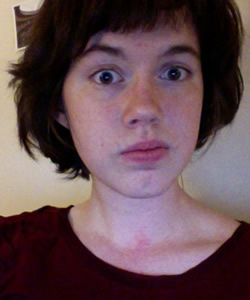Our generation gets its news from Stephen Colbert and Jon Stewart. For us humor is the highest form of dialogue and absurdism the highest form of humor. But I think this tendency derives from something not at all funny; it reflects the new terror that pervades the world in which we’ve come of age. We live in a world where whole lives are made and lived in a ‘place’ that doesn’t physically exist, where communication is constant but connection perhaps more rare. We know the Internet to be sometimes duplicitous; people may not be who they say they are, what you read may not be the truth. We were taught young not to believe everything we read in this multilayered, infinite Other World to which we lose so many hours; we mustn’t eat of its fruit without intense examination of what, precisely, we’re consuming.
This is one part of our generational character; another comes from the fact that our intellectual and political formation has occurred against the backdrop of a war on not a nation but an idea. Ours has been a very big world, and one full of doubt. The first president we remember was nearly impeached; the first presidential election in our memory required a Supreme Court decision to resolve. And then, of course, there was 9/11.
What we’ve seen and keep seeing are the dangers of extremism. Extremists, the killers and maimers and torturers in the name of a noble end, are the most dangerous of all because they believe unshakeably that they’re right. The tragedy of terrorism is that it is uncomplicated; it requires a worldview defined by immutable opposites rather than connections.
Our generation is extremely complicated. We see the shades of grey in opinions and in what passes for truth every time we skim through what our friends have shared on Facebook. We live every moment in a clatter of voices with little guide to which speak the truth. We change our minds-- we get new information every minute. We’re a little suspicious, and sometimes specifics elude us.
This is, I think, why Occupy Wall Street can be so inchoate in terms of its goals and yet possesses a particular ethos, as do we. We were taught in preschool that everyone is special and that sharing is caring: this gives us an ethic that encompasses both the right to individual choice and the obligation to help one another, which makes us as a group more concerned about social justice than legislating social mores.
I’ve noticed on the Internet a solidarity among people our age. Used to starting conversations with total strangers online, we can be constantly ready to reach out and connect. There is a sense that we’re in this together, rather than that we’re in competition for scarce jobs. The question now is whether we’re ready to risk taking a stand, getting down to specifics, and making a future in which we want to live; the problem will be getting us all to merge something like a coherent voice.

